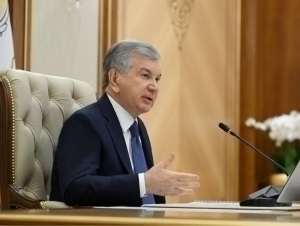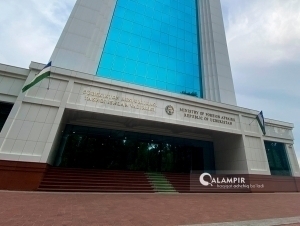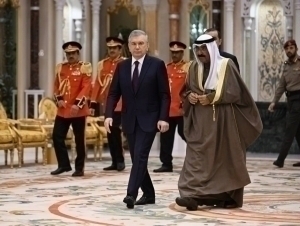Germany's give-and-take in Central Asia
Review
−
18 September 2024 11855 7 minutes
Germany, Europe’s most powerful nation, is grappling with two significant challenges: the migration crisis and energy dependency. Surprisingly, the search for solutions to these pressing issues has led the country to Central Asia, specifically Uzbekistan and Kazakhstan. From September 15 to 17, German Chancellor Olaf Scholz made an official visit to these two nations, and the agreements forged during his trip reflect the characteristic precision of German diplomacy. But what did Germany gain, and what did it offer in return? Let’s take a closer look at the key points of these strategically important negotiations.
Trade-off: Afghan refugees and skilled Uzbek workers
Germany has been one of the European countries hardest hit by the migration crisis, and the numbers paint a stark picture. In September 2023 alone, 21,366 people entered the country illegally—the worst statistic in recent years. From January to September of the same year, 92,119 illegal entries were recorded, surpassing the total of 112,000 from 2016. Migration has become a hotly debated issue in Germany, putting immense pressure on policymakers to find sustainable solutions. Even Angela Merkel, Germany’s longest-serving chancellor, faced a significant drop in popularity over her handling of the migration crisis in 2015.
The situation worsened in August 2021 with the political upheaval in Afghanistan. When the Taliban took control of the country, many Afghans fled, seeking refuge abroad. Germany responded by taking in 33,000 Afghan refugees and later accepted another 11,000. By the end of 2021, the number of Afghan nationals in Germany had surged to 395,000, making them the largest refugee group in the country, surpassing Syrians. This rapid increase created new social and economic challenges, with concerns over unemployment, crime, and the overall quality of life.
To combat the growing crisis, Germany has declared an open battle against illegal migration. In June 2023, the leaders of the country’s ruling coalition parties met to address the issue, with Chancellor Scholz stating, “We must finally deport those who do not have the right to stay in Germany on a large scale.” Simultaneously, he underscored the importance of attracting skilled migrants to rejuvenate Germany’s aging workforce, recognizing that the country needs both a reduction in illegal migration and an influx of qualified labor.
Germany’s visit to Central Asia, particularly Uzbekistan, plays into this dual strategy. Scholz’s discussions with Uzbekistan’s leadership likely touched upon opportunities for skilled Uzbeks to work in Germany, balancing the inflow of refugees with the need for trained professionals. The visit exemplifies Germany’s careful, calculated approach to addressing its internal challenges by fostering cooperation abroad.
Germany’s recent efforts to address its migration crisis are closely tied to a strategic agreement with Uzbekistan, signaling a complex exchange involving Afghan refugees and skilled Uzbek workers. As Germany grapples with a surge in illegal immigration, with more than 92,000 people entering the country illegally between January and September 2023, the government is taking decisive action. At the same time, the country is seeking to boost its aging workforce by attracting skilled labor from abroad. These two challenges have led to intriguing negotiations between Berlin and Tashkent, hinting at a mutually beneficial deal.
At the core of this exchange is the issue of Afghan refugees. According to a Bloomberg report shared by QALAMPIR.UZ, Uzbekistan is set to play a critical role in helping Germany deport Afghan migrants who have been denied asylum. In May 2023, a German delegation, led by Interior Minister Nancy Faeser, visited Tashkent to discuss a migration and deportation agreement. Under this deal, Germany plans to send Afghan refugees to Uzbekistan, from where they would be transferred to neighboring Afghanistan, thereby avoiding direct dealings with the Taliban, whom Berlin does not recognize as a legitimate government.
For Uzbekistan, the deal offers more than just a role as mediator. Tashkent reportedly attached conditions to the agreement, seeking to secure legal migration pathways for skilled Uzbek workers to Germany. This exchange would see Uzbekistan accepting Afghan deportees in return for sending qualified workers to fill critical labor shortages in Germany.
The agreement, initially met with skepticism, appears to be coming to fruition. During German Chancellor Olaf Scholz’s recent visit to Uzbekistan, eight bilateral agreements were signed, including one focusing on migration and mobility. Under this deal, over 800 nurses from Uzbekistan will be employed in Germany, with salaries of €2,200. Additionally, German companies will provide training for bus drivers and train operators from Uzbekistan.
According to Behzod Musayev, Uzbekistan’s Minister of Employment and Poverty Reduction, this agreement marks a significant achievement for Uzbekistan in expanding legal work opportunities for its citizens abroad. As part of the arrangement, Uzbekistan is also preparing to facilitate the deportation of Afghan refugees from Germany via Termez, further highlighting the depth of this partnership.
The deal underscores Germany’s effort to balance its domestic challenges while addressing global migration issues, with Uzbekistan emerging as a key player in this complex geopolitical equation.
Berlin's energy interests in Kazakhstan amid global shifts
Germany's dependence on Russian energy was once significant, with 32% of its gas imports and 34% of its oil coming from Russia before the war in Ukraine. The Russian invasion, however, forced Berlin to seek alternative energy sources. Kazakhstan, a growing energy supplier, has become central to Germany's efforts to diversify its energy imports, which was a key focus during German Chancellor Olaf Scholz’s recent visit to Central Asia, including stops in Uzbekistan and Kazakhstan.
Germany now imports 11.7% of its oil from Kazakhstan, making it the third-largest supplier after Norway and the U.S. During Scholz’s discussions with Kazakh President Kassym-Jomart Tokayev, the two leaders explored the possibility of increasing these energy imports. Kazakhstan currently exports 100,000 tons of oil per month to Germany, and there are expectations to boost this volume by the end of 2024. Tokayev also emphasized that energy remains a priority in the bilateral relations between the two nations, reflecting Kazakhstan’s growing role in Europe’s energy markets, especially in the aftermath of the Ukraine war.
Tokayev further expressed Kazakhstan's interest in trading raw materials for German technologies, signaling an equal exchange that benefits both sides economically. Scholz echoed this sentiment, pledging to improve opportunities for economic cooperation, especially in raw materials.
The visit, however, wasn’t solely focused on energy. The leaders also discussed political issues, particularly the ongoing conflict between Russia and Ukraine. Tokayev’s statements on the Ukraine war sparked international attention. He described Russia as “militarily invincible” and expressed support for peace initiatives proposed by China and Brazil, which some have criticized for lacking a clear path to conflict resolution. Tokayev’s comments, while controversial, reflect Kazakhstan’s delicate balancing act given its close ties with Russia and its diplomatic relations with Ukraine.
Despite the productive discussions, a joint press conference between Scholz and Tokayev was unexpectedly canceled by the Kazakh side. Scholz, however, addressed journalists separately, reiterating his commitment to ensuring free press access wherever possible.
In conclusion, Scholz’s visit to Kazakhstan underscored Germany’s efforts to secure energy independence from Russia, with Kazakhstan poised to play a crucial role in this shift. The visit also highlighted Kazakhstan’s strategic importance in global diplomacy, given its unique position in Central Asia and its complex relationship with neighboring Russia.




